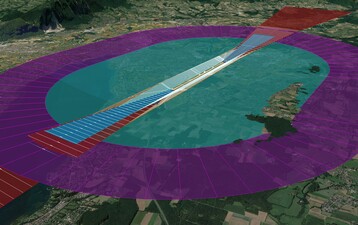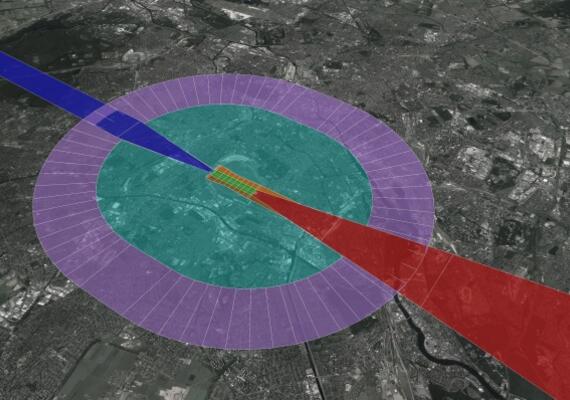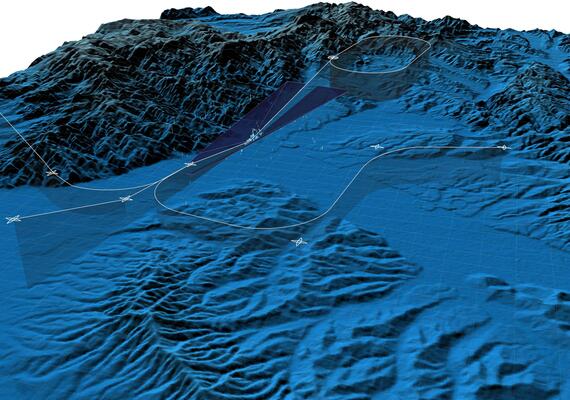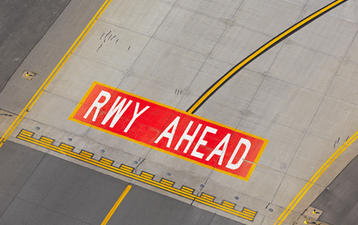NEW
Obstacle Limitation Surfaces (OLS): Introduction of Current and Foreseen OLS
Safe airport operations demand a permanent monitoring of obstacles in the close proximity of airports. The construction of new infrastructure or changes to airport operations require systematic obstacle evaluations and assessments to maintain an acceptable level of safety.
International regulations from the International Civil Aviation Organization (ICAO) as described in Annex 14 Vol. I specify airspace around aerodromes to be maintained free from obstacles. For that purpose, Obstacle Limitation Surface (OLS) are described.
Nevertheless, history shows that the OLS become penetrated by new obstacles world-wide, and it becomes more difficult to protect the surfaces against new obstructions. The reasons are manifold and include unclear objectives of the OLS, inconsistencies between ICAO Annex 14, Annex 6, and PANS OPS requirements as well as unclear adequacy between the obstacle requirements of the surfaces and the complex impact of obstacles on the operations.
To address the deficiencies of the current OLS, the ICAO intends to revise the OLS. Over the last years, the ICAO Obstacle Limitation Surfaces Task Force (OLSTF) developed a new twofold concept of Obstacle Free Surfaces (OFS) and Obstacle Evaluation Surfaces (OES). Furthermore, a new code systematic, the aeroplane design groups (ADG), for the design of the OFS and OES is foreseen.
The objective of this training course is to provide a comprehensive overview of both, the current Obstacle Limitation Surface (OLS) as described in ICAO Annex 14 Vol. 1 as well as of the foreseen new surfaces. The new concept, ADG as well as the OFS and OES are presented.
Attendees will learn how to establish the relevant Obstacle Limitation Surfaces (OLS, OFS, OES) and how to determine surface infringements.
This three-day course is designed for all persons involved in this complex subject, including aerodrome, Civil Aviation Authority personnel, or project developers.
Please note: This course aims to present the principles and characteristics of the relevant Obstacle Limitation Surfaces (OLS, OFS, OES). To learn more about how to assess relevant Obstacle Limitation Surfaces, to evaluate the significance of penetrating obstacles and to develop appropriate safety measures where necessary, airsight offers another training course.
Course Details
Location:In-houseLanguage:English
Duration:3 days
Provider:airsight GmbH
Course Content
Regulations and Fundamentals
- International Civil Aviation Organisation (ICAO)
- Categories of aircraft, aerodromes and runways
ICAO Obstacle Limitation Surfaces (OLS)
- Horizontal and Conical surfaces
- Approach surface
- Transitional surface
- Take-off climb surface
- Obstacle Free Zone (OFZ)
Aerodrome Areas and further obstacle protection surfaces
- Runway strip
- Runway End Safety Area (RESA)
- Clearway
- PAPI obstacle protection surface
- Light plane
- Visual Segment Surface (VSS)
Foreseen ICAO Obstacle Limitation Surfaces
- Background and the new concept
- New Aeroplane Design Groups (ADG)
- Obstacle Free Surfaces (OFS)
- Obstacle Evaluation Surfaces (OES)
Trainer
Dipl.-Ing. Malte Karger
Malte is responsible for flight procedure design and obstacle assessments of airsight’s consulting division. He is also a renowned and appreciated trainer, sharing his knowledge and practical experience with other industry experts in airsight’s scheduled as well as customised in-house training courses in countries such as Germany, Greece, Switzerland and Turkey.
As an advisor of ICAO’s Instrument Flight Procedure Panel (IFPP) in the capacity of a field expert, Malte participates in the Obstacle Limitation Surfaces Task Force (OLSTF).
Malte acquired extensive experience on international projects dealing with obstacle assessments and aeronautical studies for clients such as Berlin, Dubai, Hamburg, Luxembourg, Malta, Nuremburg, Stuttgart and Warsaw Airports as well as for several smaller airfields. Furthermore, he conducted numerous flight procedure design projects (conventional and RNAV/PBN) for Airports, for Airlines (e.g. Air Austral, Air Transat) as well as for Air Navigation Service Providers such as MATS (Malta Air Traffic Services) and Romanian Air Traffic Services Administration (ROMATSA).
Prof. Dr.-Ing. Holger Schulz
Holger is the co-founder and managing director of airsight. He holds a PhD in Aeronautical Engineering. His doctorate on the subject of satellite-based precision approach procedures (GBAS) gained him international recognition by organisations such as the International Civil Aviation Authority (ICAO). Since 2014 Holger is an honorary professor in the field of "Airport Planning" at the Institute of Aeronautical Engineering and Transport Systems of the Technical University of Berlin for which he has held a teaching role for many years, specialising in "Airport Planning" and "Flight Procedure Design".
Holger is highly regarded amongst his peers on a national and international basis. His extensive experience ranges from comprehensive project and consulting experience to advising roles in various international bodies such as the Aerodromes Panel and the Instrument Flight Procedures Panel (IFPP, former OCP) of the ICAO, the Technical and Operational Safety Committee (TOSC), the Single European Sky (SES) Steering Group of Airport Council International (ACI), the European Organisation for the Safety of Air Navigation (EUROCONTROL) and the European Aviation Safety Agency (EASA).
Holger also holds a Commercial Pilot’s License (CPL) and is a certified aviation auditor.
Target Group
- Aerodrome safety experts
- Aerodrome engineers and planners
- Air traffic control staff
- Aviation safety experts
- Architects and civil engineers
- Civil Aviation Authorities staff
Organisational Details
airsight offers this training course on request, worldwide. At the end of the course, all participants will receive an airsight certificate based on EASA training regulations, which is highly recognized throughout the aviation industry.
About airsight Training
airsight Training course quality
airsight operates an ISO 9001 certified Quality Management System and pursues the objective to provide high quality services that fully meet the clients’ needs.


 Training 5 or more people? Ask for an In-house course at your premises or online!
Training 5 or more people? Ask for an In-house course at your premises or online!


